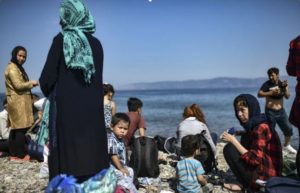Refugee rights slipping away – UNHCR
 The United Nations refugee agency UNHCR has warned that a rising number of people are fleeing conflict and persecution around the world at a time when more and more countries are closing their doors.
The United Nations refugee agency UNHCR has warned that a rising number of people are fleeing conflict and persecution around the world at a time when more and more countries are closing their doors.
UN High Commissioner for Refugees Filippo Grandi warned that populist politics and fear-mongering about immigration were eroding international protection for refugees fleeing conflict and persecution, speaking at the agency’s annual refugee conference in Geneva.
Mr Grandi said global displacement were at record levels when he took office in January 2016, but the number of displaced has since increased to 68.5 million — with 28 million of them refugees.
“The crisis affects nearly every region of the world — the Middle East, Africa, Central America, Asia and even in Europe, in Ukraine — and while neighboring countries largely have kept their borders open to refugees, some have not,” Mr Grandi said.
He noted that most of the burden falls upon poor, developing countries which host 84 per cent of the world’s refugees.
“Yet, further afield, often in rich countries, the trend is toward making it difficult for people to seek asylum — even by closing borders and pushing people away,” he said.
“Children separated from their parents, leaving psychological scars that will last a lifetime. … Refugees dehumanized, treated as a commodity, passed from one state to another.”
Mr Grandi said it was becoming increasingly difficult to ask poor countries to keep their doors open to refugees when some of the world’s richest countries are closing theirs. However, he said there were few examples offering glimmers of hope.
The recent peace accord between Eritrea and Ethiopia, for example, may ease the displacement crisis in the Horn of Africa and the revitalized peace agreement in South Sudan, where more than four million people have been displaced since a civil war began in 2013, offers hope.
Mr Grandi urged countries to recommit to accepting some of the world’s most vulnerable and persecuted people for resettlement, calling resettlement a limited but important solution toward easing the global refugee crisis.
UNHCR Assistant Commissioner for protection Volker Turk told the gathering the right of people displaced across international borders and entitled to international protection under the 1951 Refugee Convention was slipping away.
He said some governments were taking political and legal measures to narrow the concept of who is a refugee. He said being able to flee and be recognised as a refugee could be a matter of life and death.
“Unfortunately, the issue of security is too often used to adopt restrictive approaches to deny refugees protection,” Mr Turk said.
“Of course, there is no doubt governments need and must ensure the security of their citizens, but this is entirely complementary with providing refuge to people who flee persecution,” he said.
Mr Turk said refugees were the victims, not the perpetrators, of violence and terror. He said they often had rejected extremism and been targeted, forcing them to flee for their lives. He said it was unjust to deny security to people who need it most.
“I think both in the global North and the global South, I have to say, it is our observation, that the dehumanization of refugees, of migrants, of IDP’s, of stateless individuals has become a worrying trend,” Mr Turk said.
“It results from inappropriate language, misinformation, deterrence, detention, separation of families and children, and ‘warehousing,” he said
Xenophobia, racism, and bigotry often are driven by fear, anger and anxiety within communities and must be confronted and addressed,” Mr Turk said.
“History shows how the mistreatment of the foreigner paves the way for the mistreatment of the citizen,” Mr Turk said.
Laurie Nowell
AMES Australia Senior Journalist












